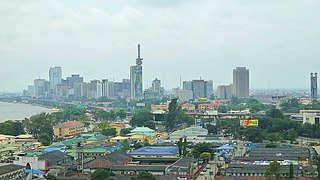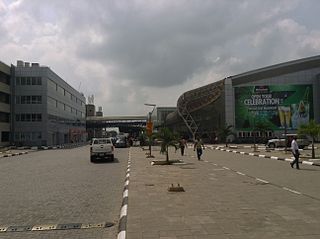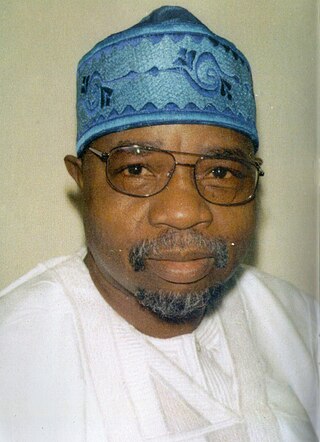Related Research Articles

The economy of Nigeria is a middle-income, mixed economy and emerging market with expanding manufacturing, financial, service, communications, technology, and entertainment sectors. It is ranked as the 31st-largest economy in the world in terms of nominal GDP, the largest in Africa and the 27th-largest in terms of purchasing power parity.

Nigeria’s transport network has expanded in recent years to accommodate a growing population. The transport and storage sector was valued at N2.6trn ($6.9bn) in current basic prices in 2020, down from N3trn ($8bn) in 2019, according to the National Bureau of Statistics (NBS). This was reflected in a lower contribution to GDP, at 1.8% in the fourth quarter of 2020, down from 2.1% during the same period the previous year but higher than the 0.8% recorded in the third quarter of 2020. One of the most significant challenges facing the sector is meeting the needs of both large coastal cities and rural inland communities in order to fully unlock the country’s economic potential. This is especially the case with mining and agriculture, both of which are expected to benefit from two large-scale projects: the Lekki Port in Lagos and the Kano-Maradi rail line in the north of the country.

Lagos is the most populous city in Nigeria as well as Africa with an estimated population of 21 million in 2015. The estimated population for Lagos city was more than 24 million in 2022; and around 30 million for the Lagos metropolitan area, including the suburban area reaching far into the neighbouring Ogun State, thus making Lagos the most populous urban area in Africa. Lagos was the national capital of Nigeria until December 1991 following the government's decision to move their capital to Abuja in the centre of the country. Lagos is a major African financial centre and is the economic hub of Lagos State and Nigeria at large. The city has been described as the cultural, financial, and entertainment capital of Africa, and is a significant influence on commerce, entertainment, technology, education, politics, tourism, art, and fashion. Lagos is also among the top ten of the world's fastest-growing cities and urban areas. The megacity has the fourth-highest GDP in Africa and houses one of the largest and busiest seaports on the continent. The Lagos metropolitan area is a major educational and cultural centre in Sub Saharan Africa. Due to the large urban population and port traffic volumes, Lagos is classified as a Medium-Port Megacity.

Ikeja is the capital city of Lagos State in southwestern Nigeria. Its population, as of the 2006 census, is 313,196. Prior to the emergence of military rule in the early 1980s, Ikeja was a well planned, clean and quiet residential and commercial town with shopping malls, pharmacies and government reservation areas. It lies 10.5 miles (17 km) northwest of Lagos city. The Murtala Muhammed International Airport is located in the city. Ikeja is also home to Femi Kuti's Africa Shrine and Lagbaja's Motherland, both venues for live music. Its Ikeja City Mall is the largest mall on the Lagos State mainland. Ikeja also has its own radio station, broadcasting both in English and in Yoruba.

Lagos State is a state in southwestern Nigeria. Of the 36 states, it is both the most populous and smallest in area. Bounded to the south by the Bight of Benin and to the west by the international border with Benin, Lagos State borders Ogun State to the northeast making it the only Nigerian state to border only one other state. Named for the city of Lagos—the most populous city in Africa—the state was formed from the Western Region and the former Federal Capital Territory on 27 May 1967.

Apapa is a Local Government Area in Lagos, located to the west of Lagos Island. Apapa contains a number of ports and terminals operated by the Nigerian Ports Authority (NPA), including the major port of Lagos State and Lagos Port Complex (LPC).

Mushin is a Local Government Area in Lagos. It is located 10 km north of the city core, adjacent to the main road to Ikeja, and is largely a congested residential area with inadequate sanitation and low-quality housing. It had 633,009 inhabitants at the 2006 Census. It is also where a lot of A list talents have risen from, artists such as Wande Coal

The National Agency for Food and Drug Administration and Control(NAFDAC) in Nigeria is a federal agency under the Federal Ministry of Health that is responsible for regulating and controlling the manufacture, importation, exportation, advertisement, distribution, sale and use of food, drugs, cosmetics, medical devices, chemicals and packaged water.

The Institute of Chartered Accountants of Nigeria (ICAN) is a professional accountancy body in Nigeria. It is one of the two professional accountancy associations with regulatory authority in Nigeria, the other being the Association of National Accountants of Nigeria (ANAN). The relationship between the two organizations has been tense. In 2007 ICAN attempted to have a bill declaring ANAN void.

Adefemi KilaListen is a Nigerian politician and engineer who served in the Senate, representing Ekiti Central in April 2007 just after working for Julius Berger Nigerian Plc for 30 years as a civil engineer and as a technical manager (administration) for 18 years. He is currently a council member of Standards Organisation of Nigeria SON. He is a devoted Christian of the Anglican church of Nigeria.

The Manufacturers’ Association of Israel (MAI) is the umbrella organization and representative body of all industrial sectors in Israel including the private, public, kibbutz, and government industries. With a membership of over 1,800 organizations responsible for more than 90% of the industrial output, the Manufacturers’ Association of Israel is the largest and most influential economic organization in the country. Dr. Ron Tomer has led the organization as President since January 30th, 2020. Headquartered in Tel Aviv, the Manufacturers’ Association of Israel has three other regional branches. The Northern branch, located in the city of Haifa, serves over 600 different member organizations which are responsible for around one third of all the industrial manpower in Israel. The Jerusalem branch, located in the city of Jerusalem, serves over 130 different member organizations. The Southern branch, located near the city of Be’er Sheva, serves over 350 different member organizations.

Raphael Adeola Alabi OON, Fellow of NSE (1941–2009) was a Nigerian engineer and industrialist. He hailed from the City of Akure, Ondo State, and he was the first indigenous engineer in post colonial Nigeria to become a 'Chief Engineer' at Guinness, Nigeria. Altogether he spent 45 years at Guinness, including 13 years as the chairman.
Hari Shankar Singhania was the President of J.K. Organisation, a leading Indian industrial group, which has its roots extending nearly 100 years, and is one of the largest industrial groups in India. It has multi-business, multi-product and multi-location operations. Most of the companies in the group are public limited entities, with more than 40,000 employees. The group has more than 500,000 shareholders, with a nationwide sales and service network of over 10,000 distributors and many retailers and service centres. The group has export interests in nearly 90 countries across the globe.

Akpan Hogan Ekpolisten is a Nigerian economist and professor. He is currently a Professor of Economics and Public Policy at the University of Uyo, Akwa Ibom State, Nigeria. Ekpo is also the Chairman of the Foundation for Economic Research and Training (FERT) in Lagos, Nigeria. He was the Director General of the West African Institute for Financial and Economic Management (WAIFEM) in Lagos, Nigeria from May 2009 to December 2018. He is a former Vice-Chancellor of the University of Uyo, Akwa Ibom State, Nigeria. Ekpo is also a former Director at the Central Bank of Nigeria.
Lagoon Hospitals, is one of the largest healthcare companies in Nigeria.

The Lagos Police Command is the Lagos State branch of the Nigerian Police Force. It is responsible for law enforcement and crime prevention in the state. The commissioner of this command is often appointed by the Inspector-General of Police. The current commissioner of the state command is CP Abiodun Alabi. The current Public Relations Officer of the Command is SP Benjamin Hundeyin. The Lagos State Police Command has different area commands and zones.

Babajide Olusola Sanwo-Olu is a Nigerian politician who has served as the governor of Lagos State since 2019.
Solomon Adun Asemota SAN is a Nigerian lawyer and human rights activist. He is the Founder and Principal Partner of the Law Firm of Solomon Asemota & Co.,, Barristers and Solicitors, with offices in Benin City, Lagos, Port Harcourt, Abuja and London. He has written several publications dedicated towards effecting a change in the state of the Nation. He became a Senior Advocate of Nigeria (SAN) in 1986. As the Nation Chairman of the National Christian Elders’ Forum (NCEF), he has made a lot of strides regarding Democracy and freedom for Christians in Nigeria.
The Nigerian Institution of Estate Surveyors and Valuers (NIESV) was founded in 1969 by the few qualified General Practice Chartered Surveyors who were mostly trained in the United Kingdom. The Institution was recognized by the Federal government of Nigeria by the enactment of the Estate Surveyors and Valuers ” Decree No. 24 of 1975.
The Raw Materials Research and Development Council (RMRDC) is a federal government of Nigerian agency for research institutions that is responsible for industrial raw materials growth, promotion and utilization supervised by Federal Ministry of Sciences and Technology. It has it head office at Maitama district Garki, Abuja. The current director-general is Ibrahim Hussaini Doko.
References
- ↑ "Nigeria Manufacturers Association (MAN) - Fortune of Africa Nigeria". fortuneofafrica.com. Retrieved 2018-10-31.
- ↑ "Manufacturers Association of Nigeria (MAN)". investor.ng. 2013-12-27. Retrieved 2018-10-31.
- ↑ Adedoyin, Ademola (May 6, 1996). ".At 25, the Manufacturers Association of Nigeria has emerged as a catalyst for the nation's economic growth". TheWeek. Lagos.